Just In
- 1 hr ago

- 2 hrs ago

- 4 hrs ago

- 5 hrs ago

Don't Miss
- Education
 UPSC CAPF 2024 registration begins; Apply online for 506 Assistant Commandant posts, Know more
UPSC CAPF 2024 registration begins; Apply online for 506 Assistant Commandant posts, Know more - Technology
 Honeywell Trueno U5100 Review: Quality Audio Meets Comfortable Design at an Oh-So Reasonable Price
Honeywell Trueno U5100 Review: Quality Audio Meets Comfortable Design at an Oh-So Reasonable Price - Automobiles
 Gujarat Targets Unauthorized White Headlights To Boost Road Safety
Gujarat Targets Unauthorized White Headlights To Boost Road Safety - News
 417 Out of 1192 Candidates In Phase 2 Of Polls Face Criminal Cases, Most From BJP: ADR Data
417 Out of 1192 Candidates In Phase 2 Of Polls Face Criminal Cases, Most From BJP: ADR Data - Movies
 Kashmera On Welcoming Govinda At Arti Singh’s Wedding: He Might Have A Problem With Me & Krushna But…
Kashmera On Welcoming Govinda At Arti Singh’s Wedding: He Might Have A Problem With Me & Krushna But… - Sports
 103 Not Out: S Ramdas - 103-year-old CSK fan fondly called 'Senior Valiban' - aspires to meet MS Dhoni
103 Not Out: S Ramdas - 103-year-old CSK fan fondly called 'Senior Valiban' - aspires to meet MS Dhoni - Finance
 Rs 44,000 Crore M-Cap Lost, Stock Falls 10%, No More 4th Largest Bank; How RBI's Ban Rocked Kotak
Rs 44,000 Crore M-Cap Lost, Stock Falls 10%, No More 4th Largest Bank; How RBI's Ban Rocked Kotak - Travel
 Escape to Kalimpong, Gangtok, and Darjeeling with IRCTC's Tour Package; Check Itinerary
Escape to Kalimpong, Gangtok, and Darjeeling with IRCTC's Tour Package; Check Itinerary
What Causes Chest Pain During Pregnancy And How To Treat It?
A normal pregnancy is 40 weeks and it is divided into three trimesters (months) and during each trimester specific hormonal and physiological changes occur.
Some of the common changes that pregnant women will experience during pregnancy include changes in oestrogen and progesterone levels, weight gain, fluid retention, changes in smell and taste, stretch marks, changes in hair and nails growth and breast and cervical changes, to name a few. Some of these changes can result in discomfort and pain in the body.
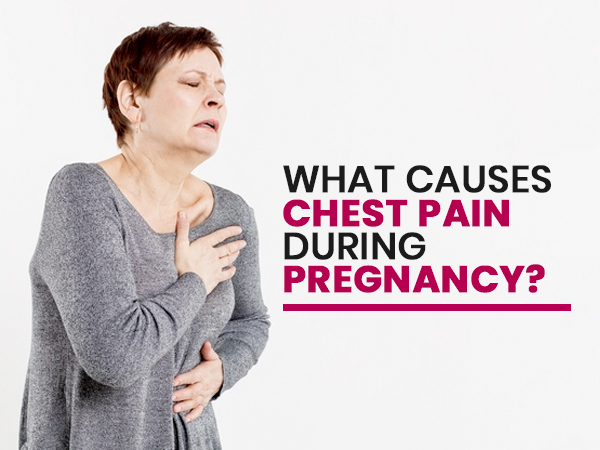
Also, many women may experience chest pain during pregnancy that occurs due to the many physiological changes. Although chest pain could be normal and is not uncommon among pregnant women, it might become a cause of concern when associated with a serious health condition [1] [2].
In this article, we'll talk about what causes chest pain during pregnancy and how it can be treated.
Causes Of Chest Pain During Early Pregnancy
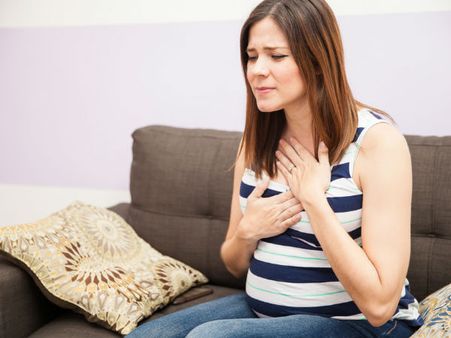
1. Heartburn
Heartburn is caused by acid reflux which can cause chest pain during pregnancy. Heartburn occurs when the stomach acid goes up into the oesophagus, the tube that carries food and water from the mouth into the stomach. The oesophagus is connected to the stomach at a juncture known as the oesophageal sphincter. If the oesophageal sphincter is working properly, it closes when the food leaves the oesophagus and enters the stomach.
During pregnancy higher levels of progesterone hormone cause the oesophageal sphincter to relax, thus increasing the risk of acid reflux and also the growing foetus that presses against your stomach leads to chest pain during pregnancy [3].


2. Morning sickness
Morning sickness is nausea and vomiting that happens during pregnancy and it can occur at any time of the day or night. The hormonal changes during pregnancy are thought to play a role in causing morning sickness. And sometimes, morning sickness can cause chest pain.

3. Asthma
If you have asthma, it might worsen during pregnancy and may cause more severe asthma symptoms which can lead to chest pain, shortness of breath and chest tightness during pregnancy [4].


4. Anxiety
If it's your first pregnancy you will surely be excited as well as worried about the health of your baby and if it's a second pregnancy after a previous loss, you may experience stress or anxiety. All these can cause chest pain, tightness in the chest and feelings of jitteriness, among others during pregnancy.
Causes Of Chest Pain During Late Pregnancy
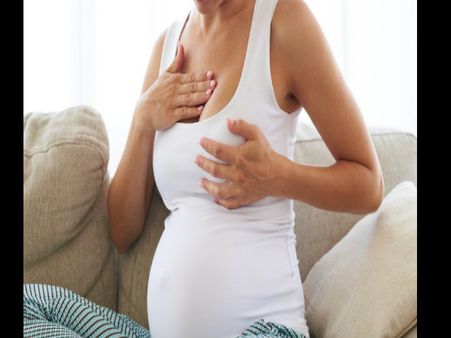
1. Breast Pain
During pregnancy, your body changes and so do the breasts. The hormonal changes cause your breasts to change in size and shape, which puts an added strain on the muscles of the chest wall and this can lead to chest pain during pregnancy.

2. Deep vein thrombosis
Deep vein thrombosis is a serious condition that occurs when blood clots form inside a deep vein, which usually happens in the legs. When blood clots travel to the lungs from deep veins in the legs it leads to pulmonary embolism. It is a life threatening condition that can cause chest pain in pregnant women.
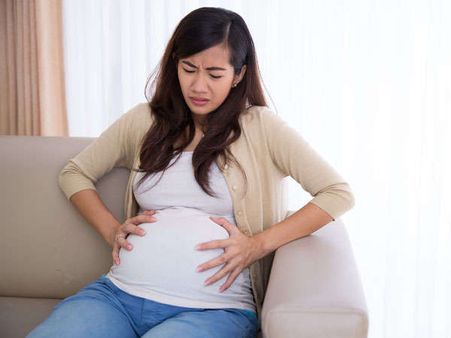
3. Peripartum cardiomyopathy
It is a heart condition that is characterised by the weakening of the heart muscles. It happens during the final month of pregnancy and may go on for five months after giving birth. Peripartum cardiomyopathy is a rare condition and can cause mild or severe symptoms such as chest pain, fatigue, shortness of breath and swelling of the ankles [5].

4. Myocardial infarction
Acute myocardial infarction is a rare condition that occurs in pregnant women, which can cause chest pain during pregnancy. It can occur during all the stages of pregnancy and postpartum; however, it most commonly occurs in the third trimester [6].
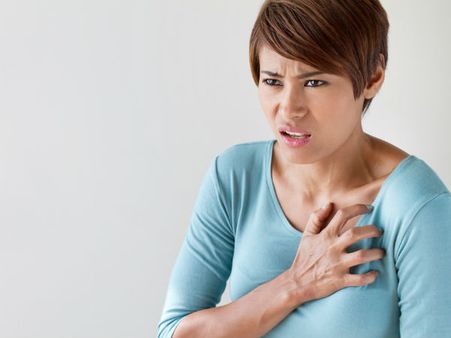
5. Coronary heart disease
Coronary heart disease is a condition characterised by the buildup of plaque in the heart's arteries, causing them to become narrower and restrict the flow of blood. This leads to symptoms like chest pain, shortness of breath and heart attack [7].
What Other Symptoms Can Accompany Chest Pain During Pregnancy?
Along with chest pain, you may experience shortness of breath, heart palpitations, fast heart rate, fatigue, low blood pressure and difficulty in breathing while sleeping or lying down.
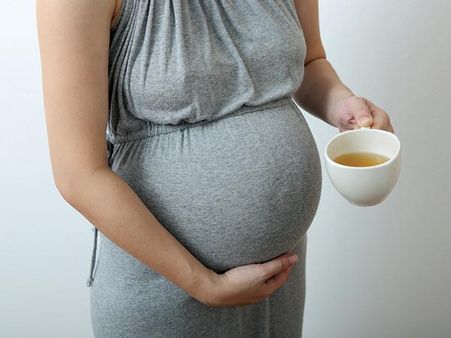
Treatment Of Chest Pain During Pregnancy
Chest pain during pregnancy doesn't require any treatment, usually home remedies work in treating mild chest pain. However, if you are having a severe chest pain that is due to a serious underlying medical condition, then your doctor might prescribe some medications to treat the underlying cause of chest pain.
And if you experience mild chest pain that is not due to a serious underlying medical condition, you could try out these home remedies:
- Eat small meals at short intervals to help relieve nausea and vomiting.
- If you are having anxiety, try meditating or listening to relaxing music.
- Avoid eating spicy foods.
- When you are lying down or sleeping, sleep with a body pillow to help support the extra weight.
- Don't sleep after a meal.
- Maintain the right posture while you are sitting or standing so that the oxygen can freely flow to your lungs.
- Lie on one side to take the pressure off your chest and lungs.
- Avoid foods that are causing heartburn and indigestion.
- Drink ginger tea to help soothe nausea
- Use cold or compress to bring relief from swelling.
- Wear a bra that gives your breasts a firm support. Avoid wearing too tight bras.
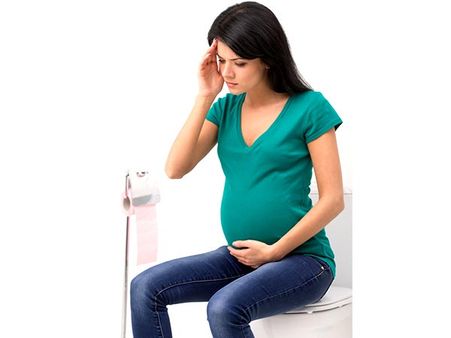
When To Seek Medical Help For Chest Pain During Pregnancy?
In most cases, chest pain is usually harmless especially if you are having a mild chest pain, but when the pain becomes severe and prolonged, it might be serious and you should seek medical attention immediately. Also, you should consult your doctor first before you try out any home remedies.
See a doctor immediately if you notice these symptoms along with chest pain:
- Sudden breathlessness
- Difficulty in breathing
- Chest pain that worsens when coughing
- Heart palpitations
- Excess nausea and vomiting
- Blurred vision
- Dizziness
- Fainting
- Headache
- Swelling of the face or any part of the body
- Fast heart rate
-
 healthGet Rid Of Gas Chest Pain Naturally: 5 Home Remedies You Can Trust
healthGet Rid Of Gas Chest Pain Naturally: 5 Home Remedies You Can Trust -
 wellnessWhat Kind Of Heart Pain Is Serious? How Do You Know If Chest Pain Is Heart Pain?
wellnessWhat Kind Of Heart Pain Is Serious? How Do You Know If Chest Pain Is Heart Pain? -
 healthWorld Heart Day: 4 Yoga Poses That Help Reduce Chest Pain; When To See A Doctor?
healthWorld Heart Day: 4 Yoga Poses That Help Reduce Chest Pain; When To See A Doctor? -
 healthWhy Are Cases Of Heart Attacks Increasing In India?
healthWhy Are Cases Of Heart Attacks Increasing In India? -
 healthHack Your Way To A Peaceful Night's Sleep When You Have A Cough
healthHack Your Way To A Peaceful Night's Sleep When You Have A Cough -
 disorders cureGastroesophageal Reflux Disease (GERD): Symptoms, Causes, Diagnosis, Treatment & Prevention
disorders cureGastroesophageal Reflux Disease (GERD): Symptoms, Causes, Diagnosis, Treatment & Prevention -
 disorders curePericarditis: Causes, Symptoms, Diagnosis And Treatment
disorders curePericarditis: Causes, Symptoms, Diagnosis And Treatment -
 disorders cureAngina: Types, Symptoms, Causes And Treatment
disorders cureAngina: Types, Symptoms, Causes And Treatment -
 nutrition11 Lesser Known Health Benefits Of Hawthorn, The Heart Herb
nutrition11 Lesser Known Health Benefits Of Hawthorn, The Heart Herb -
 wellnessChest Pain: Causes, Symptoms And First Aid Information
wellnessChest Pain: Causes, Symptoms And First Aid Information -
 wellness10 Signs And Symptoms Of Heart Murmur
wellness10 Signs And Symptoms Of Heart Murmur -
 wellnessAre You Having These Breathing Problems? Don’t Ignore Them
wellnessAre You Having These Breathing Problems? Don’t Ignore Them


 Click it and Unblock the Notifications
Click it and Unblock the Notifications




